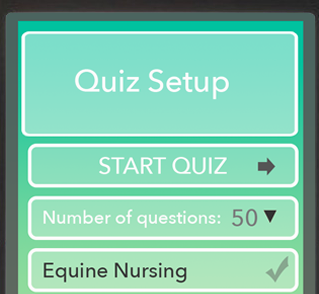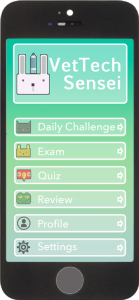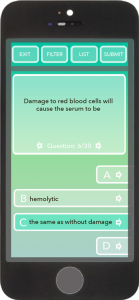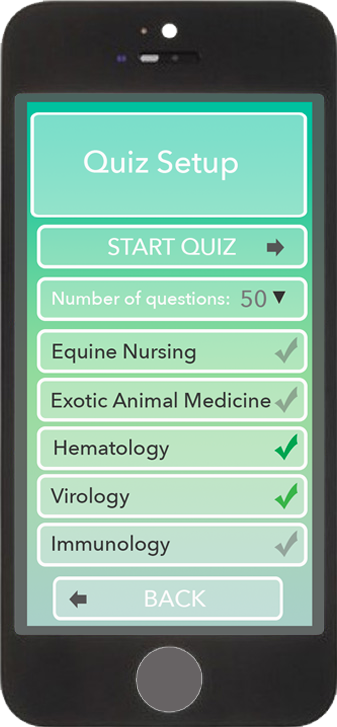Alessandra LaTour, Becker College Veterinary faculty, on behalf of the School of Animal Studies Veterinary Technician National Exam (VTNE) Committee, asked me to lead the development of a prototype, “Vet Tech Sensei”. LaTour designed and authored a large database of questions, answers, and distractor responses to help students study for the Veterinary Technician’s exam. She approached me to help her integrate the work into an application for use as a study resource. While she found one existing app that provides a mobile quiz for the exam already, it is expensive and does not, of course, utilize LaTour’s expertly researched and written question bank. Further, its limited approach of merely presenting a series of questions and grading at the end, left significant room to create a far more effective app. I developed a design for a general purpose mobile study application which would also specifically address the client’s needs. I then used this real-world production as the focus of my mobile applications course. Students worked with the Unity engine to build the application to spec over the course of the semester.
The design called for a relational data structure to hold the categories, questions, answers, and distractors which could be augmented without relying on an update to the application on the users’ devices. In other words, the database exists on a remote server and the application installed on the user device makes a call to the server for the database rather than relying on a locally stored copy of the data. Whenever LaTour wishes to update her content, she can do so seamlessly in the eyes of the users.
I included various features which I felt were important in acquiring and maintaining consistent player use. It is vital to encourage players of a study tool to use the app frequently and over a determined period of time — for instance, this study app was meant to be played daily in order to promote memorization and aid in identifying categories in which the student needs further practice. We added certain features to address this challenge: a Daily Challenge which can only be played once every 24 hours and consists of a short selection of randomly generated questions but will not include repeats across the span of one year; a Badge system which rewards players for various in-game accomplishments such as daily play, high scores, mastery of categories, etc.; a completely customizable Quiz Generator which allows the user to determine how many questions, how much time permitted, which categories the questions will come from, and whether the user can return to a question after answering; a Results View which presents an easily readable and digestible display of user statistics such as score history, longest track record, and improvement metrics.
It was also important to foster a sense of competition in order to encourage improvement and repeat use. For this, we required a login system that would allow for the comparison of scores amongst users. I specified that we would use Facebook, so that we were able to compare not only a user’s score to other users’ but also base the comparison on something more meaningful, such as only comparing to one’s friends, or even creating comparisons between various users’ schools — since educational institution is one of the pieces of demographic data that Facebook provides. One unique feature that was developed with the students was the ability to temporarily remove test answers which a user wished to eliminate as they narrowed down the possible correct choices from the four presented — we called this ‘Answer Shelving’.
After leading the development for 14 weeks, I acted as Build Manager and Quality Assurance lead, working with LaTour to identify users preparing for the exam who could test the study app on their mobile devices. I built and deployed the application to be used on a variety of iOS and Android devices, then gathered feedback which she assessed in order to create a final list of changes she felt were needed in order for the title to move forward in development.
Outcomes:
I enjoyed developing a study application which worked as more than a presentation of questions and answers, and in fact encouraged consistent and extended use while providing valuable feedback to improve learning outcomes. Once again I was fortunate enough to provide this real-world project as a Becker College exclusive learning opportunity to our students. Students gained experience developing for a ‘serious’ game title; working for a product owner rather than being able to work for themselves; producing for a mobile environment which brings restrictions on data size, processor performance, screen presentation and input methods; and learning to overcome the challenges of a 2D environment.



